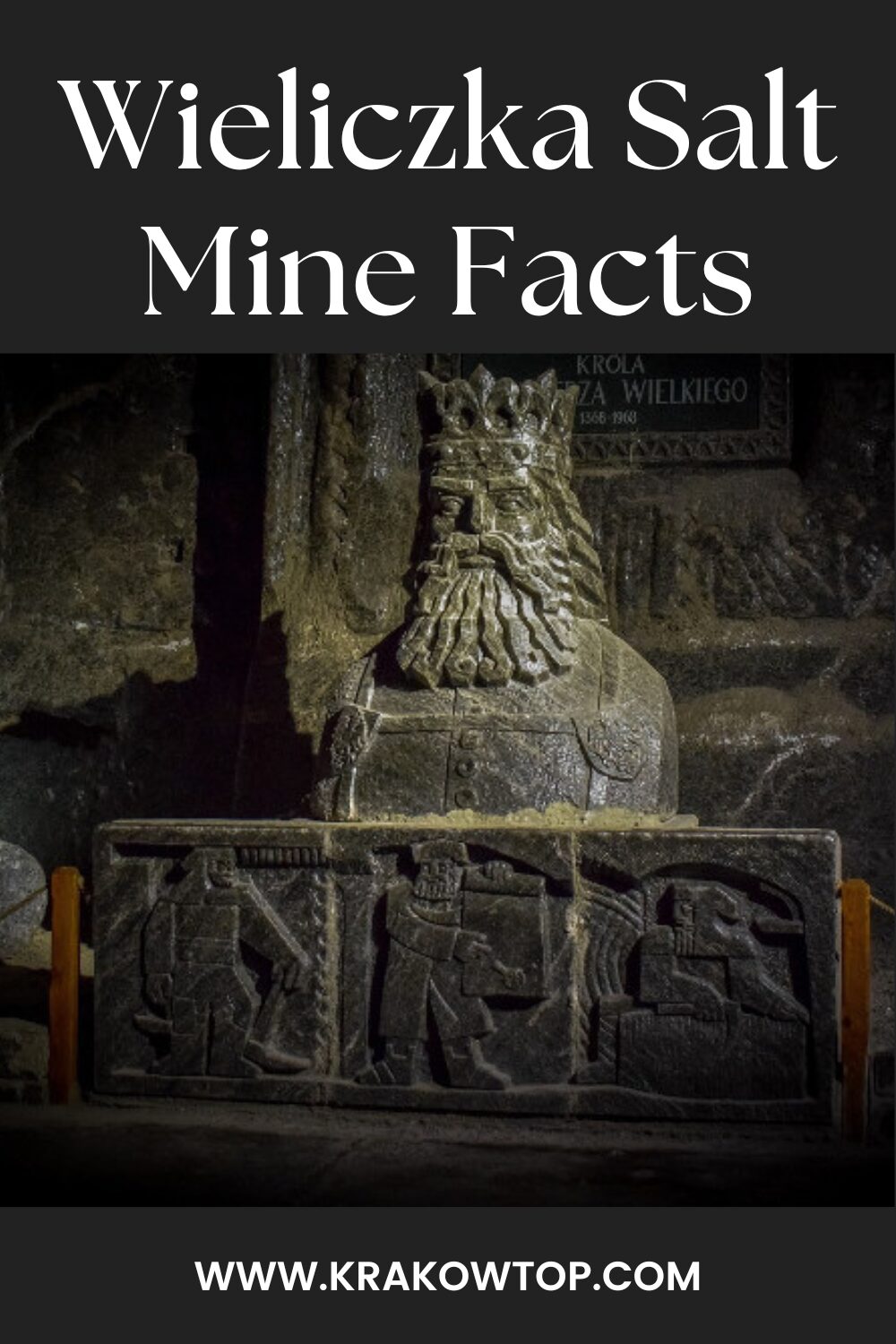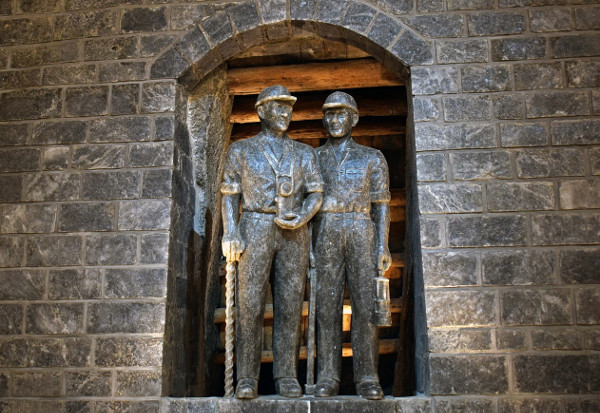Nestled in the small town of Wieliczka near Kraków, you’ll find one of Poland’s most remarkable subterranean treasures, the Wieliczka Salt Mine. With origins dating back to the 13th century, this historic mine forms an important part of Poland’s industrial heritage. For centuries, it was a prime source for table salt, which was a precious commodity, leading to Wieliczka’s recognition as one of the world’s oldest salt mines.
The labyrinthine depths of the Wieliczka Salt Mine are remarkable, with nearly 300 kilometres of tunnels spreading over nine levels. Exploring this underground wonder, you will come across four exquisite chapels, a serene underground lake, and grand cavernous chambers, all carved from salt by the miners who toiled here over the ages.
This mine ceased its commercial mining operations in 1996, but the intricacy of its corridors, the craftsmanship of salt-sculpted artworks, and the legacy of its historical technology draw you to this UNESCO-listed site.

Your visit descends hundreds of metres below the earth, offering insight into the life and work of generations of miners. The convergence of natural geology with human endeavour has created a captivating domain beneath Poland’s surface.
The preservation efforts and the mine’s adaptation as a significant tourist and educational site ensure the longevity of its storied past, making your experience in these depths both enlightening and memorable.
Historical Significance of Wieliczka Salt Mine

Your exploration of the Wieliczka Salt Mine is not only a journey through vast underground chambers but also a passage through centuries of history.
Here, you’ll discover the mine’s origins in the 13th century, its pivotal role during World War II, and its distinguished recognition as a UNESCO World Heritage Site.
Founding and Development
The Wieliczka Salt Mine traces its beginnings to the 13th century when workers first unearthed grey rock salt. These discoveries led to the construction of the mine’s initial shafts.
Over 700 years old, the mine’s historical narrative tells a tale of both humble origins and grandeur. Salt, often referred to as “white gold,” was a precious commodity, and its extraction at Wieliczka played a vital role in the region’s economy.
- 13th Century: Founding of the mine with the excavation of first shafts
- 700+ Years: An expansive timeline denoting continuous development
The Wieliczka and Bochnia Royal Salt Mines, as they were historically known, contributed significantly to the region’s development and wealth.

The Role During World War II
Your attention is now drawn to the mine’s less known yet critical role in World War II. The extensive network of tunnels and vast spaces within the Wieliczka mine were repurposed for various wartime activities, some of which included the storage of valuable artefacts and as clandestine manufacturing sites away from the prying eyes of enemies.

UNESCO World Heritage Site Recognition
Finally, your exploration brings you to a crowning accomplishment. In 1978, the extraordinary historical and cultural significance of the Wieliczka Salt Mine was recognised globally when it was inscribed on the UNESCO World Heritage List. This recognition affirmed its standing as one of the world’s most valued historical sites.
- Inscribed in 1978: Became one of the first UNESCO World Heritage Sites
- Continued Conservation: Efforts to ensure the site’s integrity, leading to its removal from the List of World Heritage in Danger in 1998
Commercial mining may have ceased in 1996, but the mine’s legacy endures, embodying over seven centuries of Polish history.
Geological Aspects
As you explore the Wieliczka Salt Mine, consider the natural processes that led to the creation of this subterranean wonder and the immense scale of its structure.
Formation of Salt Deposits
The rock salt deposits within Wieliczka Salt Mine were formed over millions of years. These deposits are primarily composed of sodium chloride, which accumulated historically due to the evaporation of seawater. As the water evaporated, it left behind thick layers of mineral-rich salt.
In the region of southern Poland where the mine is located, these geological processes were particularly favourable for creating the vast rock salt deposits that would eventually be extensively mined.
Structure and Depth of the Mine
When discussing the mine’s structure, you are looking at an extensive network of tunnels and chambers. The Wieliczka Salt Mine extends approximately 178 miles (about 287 kilometres), with its deepest point reaching around 1,073 feet (327 metres) below ground.
The mine comprises nine levels of labyrinthine passageways and over 2,000 individual chambers connected through the vast extent of excavated spaces. This intricate structure is a testimony to the scale of rock salt mining operations that have occurred here since the 13th century, cementing its place as one of Europe’s oldest salt mines.

Mining Operations
Mining operations at the Wieliczka Salt Mine have historically hinged on the extraction of salt from upwelling brine and evolved over centuries with innovations in machinery and tools.
Traditional Salt Mining Techniques
Centuries ago, your ancestors might have witnessed the extraction of salt using basic yet effective methods at Wieliczka. Salt mining initially involved evaporating the water from upwelling brine sourced naturally within the mine. This would yield sodium chloride—table salt—which was a precious commodity.
As you delve deeper into the history, you find horses played a crucial role, operating on treadmills to power the machinery needed to transport the brine and move extracted salt rocks. The mining complex, inclusive of the Saltworks Castle in Wieliczka, not only served as a production site but also as an administrative centre, showcasing the significance of salt in the region’s development.

Modern Mining Advancements
As time progressed, so did the methods employed in Wieliczka’s salt extraction. The introduction of electric and diesel-powered machinery revolutionised the operations, significantly increasing efficiency and safety.
By the 20th century, your visit would have been greeted with technology that could extract up to 20,000 tonnes of salt annually. Despite these advancements, the traditional role of horses was preserved for certain tasks until 2002, creating a blend of old and new within the depths of the mine.
Notably, under Austrian management following the partition of Poland, enhanced techniques further improved productivity, firmly establishing Wieliczka as a hub of industrial prowess.
Architectural Marvels
The Wieliczka Salt Mine is not only a historical site but also a showcase of subterranean architectural brilliance, featuring chapels and sculptures carved directly out of the rock salt by the miners themselves.

Chapels and Sculptures
Within the labyrinthine passages of the mine, you’ll find a remarkable collection of religious chapels, each intricately decorated with salt sculptures and reliefs. The most renowned is the Chapel of St. Kinga, often referred to as the Kinga Chapel, which epitomizes the miners’ devotion and artistic skill.

This grand chapel is adorned with chandeliers made from salt crystals, providing a soft illumination to the space.
- St. Kinga Chapel dimensions: 54m in length, 18m in width, and 12m in height.
At nearly 101 metres underground, this chapel is also home to intricately carved replicas of biblical scenes and statues, including a rendering of the Last Supper. The walls, glistening with salt, enhance the grandeur of the artworks that envelop you.

Engineering Structures
While the artistry captures your attention, the mine’s engineering structures exemplify the advanced and robust design that has safely supported operations and visitors for centuries.
As you traverse the subterranean depths, you’ll walk under wooden beams that line the ceilings, a testament to the miners’ ingenuity in securing the tunnels.
- Support Structures: A network of pillars and braces maintain the structural integrity of the mine.
The extensive network of passageways, chambers, and lakes evidences the technological advancements over the mine’s history. The balance of form and function is clear at every turn, instilling a sense of awe in the durability and aesthetic appeal seamlessly blended into the mine’s design.
Tourism and Culture
Exploring the Wieliczka Salt Mine near Kraków, offers you a blend of historical tradition and contemporary cultural experiences. As you venture into one of Poland’s most valued treasures, prepare to unearth a subterranean world that hosts both cheap tours and a variety of cultural events.
Public Tours and Routes
Embarking on public tours at the Wieliczka Salt Mine, you descend via stairs or a shaft to begin your journey through a maze of tunnels. The Tourist Route stretches over 3 km, presenting an opportunity to witness the craftsmen’s art in rock salt sculptures and chapels.
To enhance your visit, you can opt for a guided tour, which dives into the history and details of this Polish Historic Monument.
- Distance to cover: Approximately 3 km
- Depth: 135 metres underground
- Number of chambers to visit: Over 20
A visit to the Wieliczka Salt Mine is more than just a tour; it’s a step back into a living history book, a chance to walk in the footsteps of miners and feel the essence of the earth around you.
Cultural and Social Events
Wieliczka Salt Mine is a canvas for various cultural and social events enveloped within its cavernous chambers.
Picture attending a concert by the esteemed Sinfonia Varsovia, where the acoustics within the salt-made walls carry each note perfectly. Or perhaps find yourself at a formal dinner, where the elegance of the surroundings complements the grandeur of the occasion.

Brief Overview of Events:
- Concerts: Hosted in the extraordinary chambers.
- Weddings: A unique venue for couples seeking a historic context.
- Television Productions: Has featured in “Spellbinder: Land of the Dragon Lord” and “The Amazing Race”.
- Sporting Events: Even soccer games have taken place within its expanse.
Surrounded by the heritage of Kraków, the mine provides a unique venue for various events, where you can experience culture in the depth of the earth. This terrain has proven to be a perfect backdrop for a spectrum of activities, from filming episodes of “Modern Marvels” to hosting grand celebrations beneath the surface.
Health and Wellness
When you venture into the Wieliczka Salt Mine, you’re not only stepping into a historical site but also entering a realm renowned for its health and therapeutic qualities. Here, the subterranean environment combined with the purity of the air offers unique health benefits.
Subterranean Health Benefits
Encased within the depths of the Wieliczka Salt Mine, 135 metres underground, is a remarkable health resort. While you are there, you might experience the soothing influence this location has on respiratory diseases and allergic conditions.
This effect is attributed to the healing air, which is rich in minerals like sodium chloride, known for its therapeutic properties, and further enhanced by the mine’s stable humidity and temperature.
Respiratory Treatments: The mine provides specialised respiratory treatments which can include:
- Respiratory gymnastics
- Exposure to the mineral-enriched microclimate
- Rehabilitation programs supervised by medical professionals
The Cleanest Air
One of the most extraordinary features of the Wieliczka Salt Mine is its air purity. It’s frequently cited as having some of the cleanest air in the world, making it a haven for individuals seeking relief from various health issues.
Microclimate: A combination of factors creates a microclimate that contributes to this clean air. These include:
Start Planning Your Krakow Trip Now!
- Unsure where to stay in Krakow? Discover top-rated Old Town and Kazimierz hotels with Booking.com.
- Book your airport transfer now and enjoy a hassle-free ride directly to your hotel. Driver will meet you at John Paul II International Airport Kraków–Balice.
- Take a Tour of Auschwitz. Arrange a visit to the Auschwitz-Birkenau Memorial and Museum to pay tribute and learn about this significant historical site.
⚠️ SUMMER BOOKING ALERT: Auschwitz tours are in high demand during the busy summer season. Secure your visit now to guarantee your preferred date and time slot. Last-minute availability cannot be guaranteed during this peak season. Due to increased visitor numbers in summer, it’s strongly recommended to book your tickets and tour to Auschwitz well in advance to secure your preferred dates and times! 🔖
- Explore the Fascinating Wieliczka Salt Mine! Book your guided tour today. These tours are very popular, so book early to avoid disappointment and ensure your spot.
- Looking for ideas? Check out our KrakowTOP.org recommended itineraries, including the famous Christmas Market, holiday events, and must-see Krakow attractions like Wawel Castle, Oskar Schindler’s Factory and St. Mary’s Basilica.
- Unpolluted, aerated air free from contamination
- A high concentration of airborne ions that are beneficial to your health
By visiting the salt mine, you immerse yourself in an environment starkly different from the world above, which could have a positive impact on both your mood and overall well-being. Whether you’re walking by an underground lake or simply breathing in the salt-rich air, your visit to the Wieliczka Salt Mine could be a step towards fostering better respiratory health.
Unique Facts and Features
Within the depths of the Wieliczka Salt Mine, you’ll discover a unique blend of nature’s artistry and human ingenuity. Your journey here takes you beyond mere observation, offering immersive activities in a setting rich with history.

Artistic Endeavours
The Wieliczka Salt Mine features an extraordinary collection of artistic works, most notably its salt crystal decorations. Within this subterranean world, you’ll find intricately carved sculptures and an entire chapel adorned with salt crystal chandeliers, enhancing its ethereal ambiance.
Legend attributes the discovery of the salt mine to Princess Kinga of Poland, who is memorialised by an iconic statue carved from the mine’s salt.
| Salt Art Highlights | Description |
|---|---|
| St Kinga’s Chapel | A chapel complete with altarpieces and chandeliers, all fashioned from salt. |
| Salt Sculptures | Elegant carvings depicting mythical and historical figures. |
| Crystal Decorations | Natural salt crystals are utilised to create stunning, glittering ornaments. |











As a parent, I’m always looking for educational and entertaining activities to do with my kids. The Wieliczka Salt Mine sounds like the perfect place to visit! I was amazed to learn about the mine’s vast size and the fact that it has been in continuous operation for so many centuries. The information about the underground lake and the various sculptures and artworks within the mine was also really interesting. I’m definitely planning a family trip to the mine after reading this article!
I found these Wieliczka Salt Mine facts to be both educational and entertaining. As someone who loves learning about different cultures, I was particularly interested in the mine’s role in Polish history and its significance as a UNESCO World Heritage Site. The information about the underground chapels and the statue of Pope John Paul II was also really fascinating. This article has definitely sparked my curiosity about the mine and its many wonders
I recently took a tour of the Wieliczka Salt Mine and was amazed by its beauty and history. This article does a great job of highlighting some of the most interesting facts about the mine. I was particularly fascinated by the information about the underground lakes and the unique healing properties of the mine’s microclimate. The photos of the sculptures and chapels are breathtaking, and the article has made me appreciate my visit to the mine even more!
As a lover of art and culture, I was particularly intrigued by the Wieliczka Salt Mine facts related to the sculptures and artworks within the mine. The idea that miners created such beautiful and intricate pieces using only salt and simple tools is truly incredible. I also appreciated learning about the mine’s role in Polish history and its designation as a UNESCO World Heritage Site. This article has inspired me to plan a visit to the mine and see these wonders for myself
I stumbled upon this article while researching things to do in Krakow, and I’m so glad I did! The Wieliczka Salt Mine sounds like an incredible place to visit. I was amazed to learn about the mine’s vast size and the fact that it reaches depths of over 300 meters. The information about the underground chapels and the statue of Pope John Paul II was also really interesting. I’m definitely adding the mine to my must-see list for my upcoming trip to Poland
As someone who has always been fascinated by geology, I found these Wieliczka Salt Mine facts to be absolutely captivating. The information about the mine’s formation and the various geological features within it was really interesting. I also appreciated learning about the different mining techniques used throughout the mine’s long history. This article has definitely sparked my interest in visiting the mine and seeing its wonders for myself
I recently visited the Wieliczka Salt Mine and was blown away by its incredible beauty and history. This article does a fantastic job of highlighting some of the most interesting facts about the mine. I was particularly intrigued by the information about the underground lakes and the unique microclimate within the mine. The photos of the sculptures and chapels are stunning, and the article has inspired me to learn even more about this amazing place!
As a history buff, I found these Wieliczka Salt Mine facts absolutely fascinating! I had no idea that the mine had been in continuous operation for so many centuries. The information about the mine’s role in Polish history and culture was particularly interesting. I also appreciated learning about the various sculptures and artworks created by the miners themselves. This article has definitely piqued my interest in visiting the mine